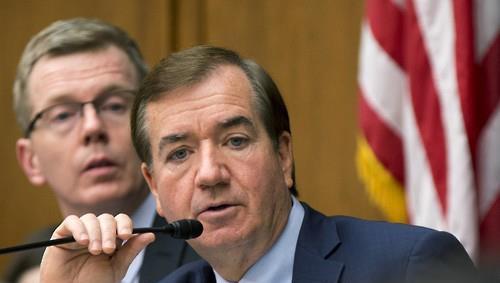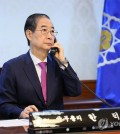- California Assembly OKs highest minimum wage in nation
- S. Korea unveils first graphic cigarette warnings
- US joins with South Korea, Japan in bid to deter North Korea
- LPGA golfer Chun In-gee finally back in action
- S. Korea won’t be top seed in final World Cup qualification round
- US men’s soccer misses 2nd straight Olympics
- US back on track in qualifying with 4-0 win over Guatemala
- High-intensity workout injuries spawn cottage industry
- CDC expands range of Zika mosquitoes into parts of Northeast
- Who knew? ‘The Walking Dead’ is helping families connect
US House overwhelmingly passes N. Korea sanctions legislation

House Foreign Affairs Committee Chairman Rep. Ed Royce, R-Calif. speaks on Capitol Hill in Washington. (AP)
By Chang Jae-soon
WASHINGTON (Yonhap) — The House of Representatives voted overwhelmingly to pass a tough sanctions bill on North Korea on Tuesday in the first tangible action taken by the United States to punish the communist nation for its fourth nuclear test.
The House voted 418-2 in favor of the legislation, H.R. 757, a week after the North stunned the world with a surprise nuclear test that it claimed involved a hydrogen bomb, a sophisticated nuclear weapon with yields much greater than conventional ones.
The legislation was introduced by Rep. Ed Royce (R-CA), chairman of the House Foreign Affairs Committee, and dozens of other House members in February last year in response to the North’s hacking attack on Sony Pictures in late 2014.
It passed through the Foreign Affairs Committee later that month, but has since been dormant.
Calls for its passage gained significant traction after the North’s nuclear test last Wednesday, with House Speaker Paul Ryan promising to put the bill to a vote and House Minority Leader Nancy Pelosi (D-CA) pledging “strong bipartisan support” for it.
The bill’s passage is the first tangible U.S. action taken to punish Pyongyang after the test.
The Senate is working on similar legislation. The administration of President Barack Obama is also looking into ways to “squeeze” the North with multilateral and unilateral sanctions, according to White House chief of staff Denis McDonough.
“The government of North Korea has repeatedly violated its commitments to the complete, verifiable, irreversible dismantlement of its nuclear weapons programs and has willfully violated multiple United Nations Security Council resolutions calling for it to cease its development, testing and production of weapons of mass destruction,” the legislation said.
It also said the North’s conduct poses an imminent threat to the security of the U.S. and its allies, to the global economy, to the safety of members of the United States Armed Forces, to the integrity of the global financial system, to the integrity of global nonproliferation programs and to the people of North Korea.
“The Congress seeks, through this legislation, to use nonmilitary means to address this crisis, to provide diplomatic leverage to negotiate necessary changes in North Korea’s conduct and to ease the suffering of the people of North Korea,” it said.
The legislation calls for mandatory sanctions against people that have materially contributed to North Korea’s nuclear and ballistic missile development or engaged in other destructive activities, including importing or exporting material related to weapons of mass destruction.
It also levies mandatory sanctions on those who import luxury goods into North Korea, or enable its censorship efforts or continuing human rights abuses, as well as those who have engaged in money laundering, the manufacture of counterfeit goods or narcotics trafficking.
The bill also provides the U.S. president with the necessary authorities to effectively target those who enabled North Korea’s cyber attack against the U.S. and provides the administration the ability to sanction those transferring or facilitating the transfer of financial assets and property of the North Korean regime.
In particular, the legislation calls for the secretary of state to “make specific findings with respect to the responsibility of (North Korean leader) Kim Jong-un” for human rights violations in the country.
“The Kim regime’s continued efforts to develop a nuclear arsenal are a direct threat to the United States. Now is not the time for more of the administration’s ‘strategic patience.’ It’s time for action,” Royce said in a statement following the bill’s passage.
“This bill will help cut off Kim Jong-un’s access to the cash he needs to fund his army, his weapons and the continued repression of the North Korean people,” the congressman said.
On Monday, Royce said the bill is “the most comprehensive North Korea sanctions legislation” that “uses targeted financial and economic pressure to isolate Kim Jong-un and his top officials from the assets they maintain in foreign banks, and from the hard currency that sustains their rule.”
He also likened the legislation to the 2005 U.S. blacklisting of a Macau bank, which almost cut off the North from the international financial system. The measure not only froze North Korean money in the bank but also scared away other financial institutions from dealing with Pyongyang for fear they would also be blacklisted.
The 2005 measure is considered the most effective U.S. sanction yet on the North.















